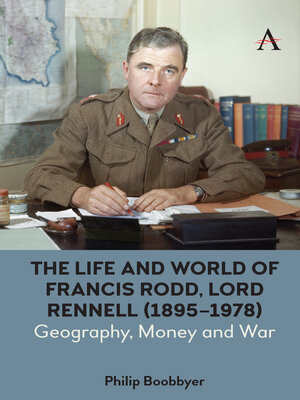The Life and World of Francis Rodd, Lord Rennell (1895-1978)
ebook ∣ Geography, Money and War · Anthem Studies in British History
By Philip Boobbyer

Sign up to save your library
With an OverDrive account, you can save your favorite libraries for at-a-glance information about availability. Find out more about OverDrive accounts.
Find this title in Libby, the library reading app by OverDrive.



Search for a digital library with this title
Title found at these libraries:
| Library Name | Distance |
|---|---|
| Loading... |
This book is a biographical study of the geographer/explorer and banker Francis Rodd, the second Lord Rennell of Rodd (1895-1978). Rodd's life is interesting for the way it connected the worlds of geography, international finance, politics, espionage, and wartime military administration. He was famous in the 1920s for his journeys to the Sahara and his study of the Tuareg, People of the Veil (1926). A career in banking included a stint at the Bank of England, before he became a Partner in the merchant bank Morgan Grenfell—where remained for most of his working life (1933-1961). During the war he worked for the Ministry of Economic Warfare (1939=40), before getting closely involved in the sphere of military government (civil affairs). In 1942, he was War Office's Chief Political Officer in East Africa. He was then appointed head of the first Allied Military Government in occupied Europe (Chief Civil Affairs Officer of AMGOT). In civil affairs, he was drawn to the principles of indirect rule. A generalist in an age of growing specialisation, he was also a mixture of traditionalist and moderniser. A product of Eton and Balliol College, Oxford, and elevated to the peerage in 1941, he was well-connected socially, and his life is a window onto British society at a time of great change.
|Francis Rodd's life is interesting for the way it connected the worlds of geography, international finance, politics, espionage, and wartime military administration. Rodd was a generalist in an age of growing specialisation; he had an instinct for problem-solving, which he applied in a range of areas. He was both a pragmatist and a man of strong convictions, and in relation to African society a traditionalist as well as a moderniser. His life, interesting in itself for what it tells us about British geography, banking and military government, is also a window onto British society at a time of great change.
More specifically, Rodd's claim to fame lies in two fields in particular: geography and military government. Geography was in the family; he was a direct descendant of the cartographer and oceanographer James Rennell (1742-1830), who was for a time Survey-General of the East India Company. His first trip to the Mountains of Aïr in what is now Niger, took place in 1922. His gravestone in the Welsh border town of Presteigne contains a saying in the Tuareg language of Tamasheq 'Naught by good', reflecting the fact that he always felt connected to this remote desert region. A product of Eton and Balliol College Oxford, he spent a year with the Royal Field Artillery in Northern France 1914-15, before moving to work in Italy and North Africa—including intelligence duties. He then worked for a time in the Foreign Office (1919-24); and it was from there that he took time out to do this first Saharan expedition. His acclaimed book—still admired to this day—on the Tuareg, People of the Veil (1926), was the result. A second expedition to the Sahara in 1927 earned him the Royal Geographical Society's Founders' Medal in 1929. Later he was President of the Royal Geographical Society as it re-established its post-war agenda (1945-48). In old age, he was increasingly preoccupied with Welsh border geography and the agriculture of Western Australia.
If geography was a life-long passion for Rodd, it was only one of his interests; indeed it was for the range of his activities that he was once called the 'last of the Elizabethans'. He left the Foreign Office for the Stock Exchange, and then joined the Bank of England in 1929, soon becoming the bank's representative at the Bank for International Settlements in Basle (1930-31). Between 1933 and 1961 he was a Partner in...







